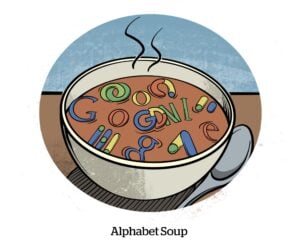Antitrust The Process
The Federal Trade Commission is probing Google and Amazon over the transparency – or lack thereof – in their respective search businesses, Bloomberg reports. The examination will focus on whether they misled advertisers about ad pricing and placements.
In the case of Google, the probe could stem from the DOJ’s antitrust suit against Google over search. During the trial, it came out Google had a penchant for raising and lowering search rates as needed to meet quarterly benchmarks. In a bit of legal discovery, former Google ad leader Jerry Dischler offhandedly referred to the practice as “shaking the cushions.”
Now, the FTC is wondering how Google could turn those knobs up or down without advertisers realizing.
Amazon, meanwhile, is facing fresh scrutiny while still managing the fallout from an earlier FTC antitrust suit, per Bloomberg’s sources. During a former investigation, the commission said it had reason to believe Amazon had deliberately skewed search results to favor sponsored ads, effectively coercing sellers into buying ads.
Disauthorized
Speaking of Amazon, it appears to be rethinking its seller categories as it weighs sales against the ad revenue those sellers drive – and Walmart seems to be doing the same.
In July, Walmart made a quiet but important change for the sellers of certain cosmetics and beauty brands. They were informed that, moving forward, Walmart will allow only authorized sellers.
Shortly after this update, and during an unrelated interview, Walmart’s VP of beauty, Vinima Shekhar, told Business of Fashion that beauty and makeup customers are a priority.
Two-thirds of Walmart’s younger shoppers are beauty product buyers, and more than 70% of those earn more than $100,000 per year. Women under 40 and those earning $100,000 are “actually our fastest-growing cohorts,” Shekhar said.
Meanwhile, Amazon just informed third-party sellers of some electronics – including top brands such as Samsung, Dyson, Canon, Philips, HP, Sony and Panasonic – that they’ll need to start sharing extra proof their branded products come from authorized suppliers, Ecommerce News reports.
That policy – for now, at least – only applies across European countries.
Not Jazzed With Taz
Taz Patel, Perplexity’s former ad chief, left the company after a mere nine months – and it appears he disappeared in a puff of smoke.
Although, how serious are (or were) Perplexity’s ad ambitions? It’s an open question.
One exec tells Digiday that his agency opted to work with Perplexity on behalf of three different clients, but were never – over a four-month period – able to set up a meeting.
This wasn’t a unique experience. Two holdco execs say they had trouble getting a hold of anyone on Perplexity’s ad team.
Perplexity worked with a limited set of clients when its ad business launched last year, but “the window never really widened,” Digiday reports.
Jesse Dwyer, Perplexity’s head of communications, tells Digiday that the team plans to experiment with a small group of advertisers over the next few years to better understand best practices for marketing as AI adoption accelerates.
“Nothing has changed in our plans or operations,” he adds.
One client speculates that Perplexity “just might be ghosting the whole industry right now, because they have no clue.”
But Wait! There’s More!
Stagwell, the agency holdco led by vocal Trump supporter Mark Penn, has aligned itself with conservative partners and clients, including Palantir and the Israeli Ministry of Foreign Affairs. Now, Stagwell walks a fine line between its leader’s politics, its employees and public sentiment. [Adweek]
Kendall Dickieson: How to be a “social-first” brand. [blog]
Microsoft and OpenAI have reached a tentative partnership deal. [The Information]
Agentic commerce is a mirage. [Mobile Dev Memo]
CMOs and CFOs should be working toward the same goals. [Harvard Business Review]
Here’s today’s AdExchanger.com news round-up… Want it by email? Sign up here.















